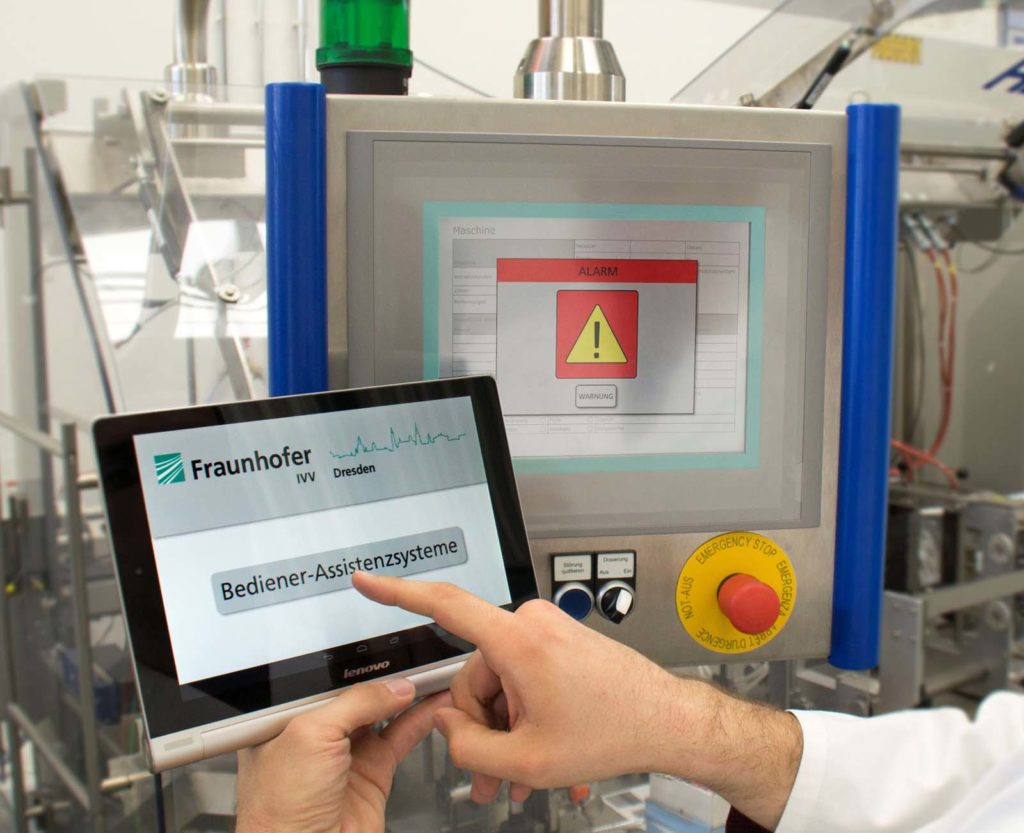
To prevent long downtimes and high quantities of scrap, manufacturers must design production processes to be stable and efficient. Particularly successful outcomes are achieved when the experience of the people who operate the machines is taken into account. The Fraunhofer Institute for Process Engineering and Packaging IVV in Dresden is developing a self-learning assistance system that helps machine operators resolve errors and build up their experience and process knowledge.
By editorial staff
To take a concrete example: On a processing machine, chocolate bars are wrapped in paper. A sensor detects a deviation in the production process and the machine stops. Even with state-of-the-art systems, a brief interruption occurs on average every five minutes. An experienced machine operator knows where the cause of the error lies. He or she sees that the paper is bending and concludes that, in this case, the speed of the machine needs to be regulated. However, this knowledge is person-specific – a colleague with less experience would need more time to find the solution.
SAM: the self-learning assistance system for machine operators
To make this experience-based knowledge available to all operators at all times, scientists at Fraunhofer IVV in Dresden are developing SAM, a self-learning assistance system for machine operators. The system observes machine states and operator actions and saves successful solution strategies. Using a tablet computer, for example, the machine operator inputs his/her solution and then links it to the current fault situation recorded by SAM. If a given fault has occurred several times, SAM recognizes it and can give the operator tips on the cause and on how to solve the problem. In this way, the machine is quickly repaired and running again.
To enable SAM to learn fault situations, the scientists at Fraunhofer IVV are using machine learning algorithms. Equipped with intelligent feature extraction, SAM is able to learn at a similar speed as humans and can recognize patterns after only a few repetitions. “Thanks to our knowledge of packaging machine processes, we’re able to make SAM very fast,” explains Andre Schult, Group Manager for Digitalization and Process Efficiency at Fraunhofer IVV.
Working with SAM is a people-centered experience
When designing SAM, Fraunhofer IVV in Dresden put people at the center of their considerations. “A human being is a wonderful tool. With their hands and eyes, they are more flexible and better than many robots or cameras,” says Andre Schult. However, processes and systems are growing in complexity all the time. With SAM, Schult also wants to enable operators in the future to recognize errors themselves and suggest their own solutions. People should know that, despite all the state-of-the-art technology, humans play an indispensable role in production. This increases their sense of value in their work and their motivation.
Together with partners from industry and science, Fraunhofer IVV plans to further develop the self-learning operator assistance system over the next five years and add new functionalities through a range of new modules. In this way, it will be possible to adapt SAM to specific customer requirements. Possible additional features include things like the use of image processing, external sensors, and speech and gesture recognition. Looking forward, manufacturers will be able to use SAM both for the operation and for the maintenance, setup, assembly and development of machines.



